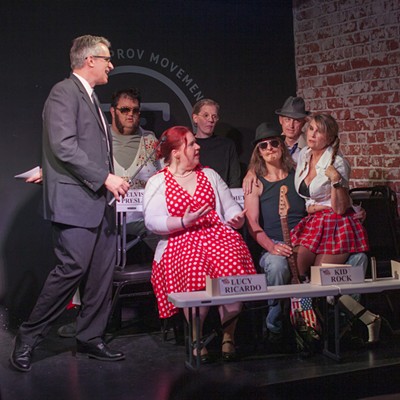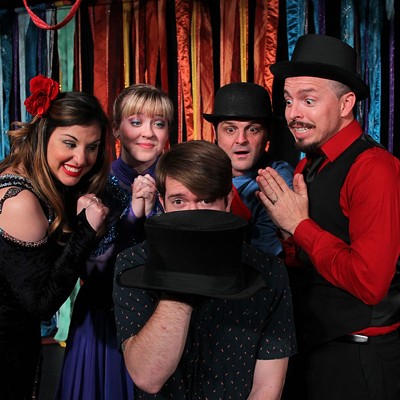Sometimes, we have to be reminded that we have it pretty good. Oh, sure, for most of us, things could be better; for some of us, things could be much better. Yes, it's all relative.
When Darkness hauls us somewhere unfamiliar and scary, we sometimes need rescuing. And sometimes, that means having some caring soul encourage us to look around—and inside—to take the measure of what we have and who we are. For many of us, we then discover that, all things considered, what we have is a pretty wonderful life.
That's what George Bailey discovers in Frank Capra's 1946 movie It's a Wonderful Life, which stars James Stewart, Donna Reed and Lionel Barrymore. It's the same story told in Live Theatre Workshop's It's a Wonderful Life: A Live Radio Play, by Joe Landry. Landry uses the convention of casting us—the theater audience—as the live studio audience for a group of famous actors of the day who are broadcasting the radio drama on Christmas Eve in Manhattan in 1946. We see the group gathered around microphones, manufacturing sound effects, and each creating several characters. The cast also delivers commercial skits and songs for the companies that sponsor the broadcast.
This is a congenial and high-spirited production, and if you love the movie, you'll likely enjoy the show. Director Sabian Trout has gathered some capable actors and makes sure they serve up the story with gusto.
Capra's personal saga is a feel-good story. An enterprising and energetic Italian immigrant, his first official career was as a chemical engineer, and he taught ballistics and mathematics to Army troops during World War I. He was a victim of the Spanish flu epidemic that killed millions worldwide, which led to Capra's medical discharge from the Army. He directed dozens of movies, although he is now chiefly associated with his films of the 1930s and '40s, which addressed social issues in comedic ways. His 1934 film It Happened One Night, starring Claudette Colbert and Clark Gable, was the first film to win all five top Oscars: Best Picture, Best Director, Best Actor, Best Actress and Best Writing, Adaptation. In general, his work represents an idealistic, optimistic and sometimes sentimental approach to life.
But when It's a Wonderful Life premiered in 1946, the moviegoing public wasn't impressed. It was considered a flop, because box-office proceeds didn't come close to covering the film's cost. Capra, however, believed it to be not only his best movie, but also "the greatest film anybody ever made. It wasn't made for the oh-so-bored critics or the oh-so-jaded literati. It was my kind of film for my kind of people."
Based on the short story The Greatest Gift, written by Philip Van Doren Stern, It's a Wonderful Life celebrates George Bailey, a truly good man whose dreams of travel and "building things" are undermined by life events that call for his attention, and for which he accepts responsibility, although sometimes reluctantly. The small town of Bedford Falls is close to succumbing to the greedy Mr. Potter's financial power, but George, who believes that people are inherently good and trustworthy, counters Potter's greed by giving folks a chance to reach for the American dream through the fair-minded policies of the Building and Loan, founded by George's father. But every man—and that would be the Everyman who Capra so characteristically celebrated—has a breaking point, and when George reaches his, feeling defeated and disillusioned, an angel trying to earn his wings intervenes and shows him what life in Bedford Falls, and beyond, would be like without his generous nature. George's epiphany reunites him with his family and friends, and he embraces what he now sees is his great good fortune.
Michael F. Woodson greets us as host Freddie Filmore, and he also reads several characters, including Mr. Potter, Uncle Billy and even one of George's kids. He seems a bit uncomfortable as Filmore, or at least not as warm and genuine as one would hope a host to be. Missie Scheffman brings us Sally Applewhite, whose chief job is bringing to life Mary, George's wife; Lori Hunt is actress Lana Sherwood, who makes us smile with her lighthearted characterizations of a half-dozen female folk. As Harry "Jazzbo" Heywood, Paul Matlock is quite charming, especially as Clarence, the angel in pursuit of his long-sought-after wings.
Stephen Frankenfield as actor Jake Laurents has the task of personifying George Bailey, and he does so with great commitment and zeal. In fact, during George's dark night of the soul, he acts his heart out, which isn't always a good thing. Intensity and depth of character can often be better served by a less-is-more approach, which certainly seems possible with Frankenfield's skills. Over-intensity tends to bring attention to the actor, not the character. But generally, Frankenfield delivers a winning George.
There are a couple of things that would make this very good production even better. One of the delights of watching a radio broadcast is enjoying the way sound effects are produced. But here, a lot of the effects are, well, lame. Some were even indiscernible from where I sat—and LTW is a tiny theater. I know LTW is capable of delivering a more-creative and effective effort, including better period costuming, or at least making sure the costumes fit correctly.
But no Grinch-iness is intended. It's a Wonderful Life: A Live Radio Play is charming and spirited. Treat yourself to a well-told story for all seasons.










